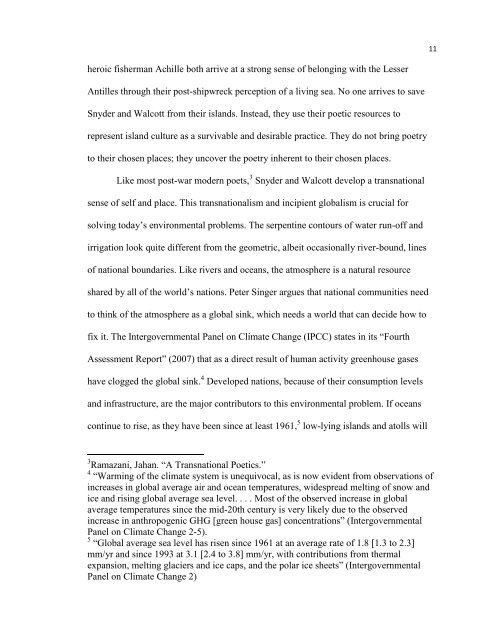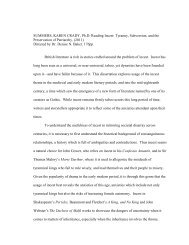RE-INHABITING THE ISLANDS - The University of North Carolina at ...
RE-INHABITING THE ISLANDS - The University of North Carolina at ...
RE-INHABITING THE ISLANDS - The University of North Carolina at ...
You also want an ePaper? Increase the reach of your titles
YUMPU automatically turns print PDFs into web optimized ePapers that Google loves.
11<br />
heroic fisherman Achille both arrive <strong>at</strong> a strong sense <strong>of</strong> belonging with the Lesser<br />
Antilles through their post-shipwreck perception <strong>of</strong> a living sea. No one arrives to save<br />
Snyder and Walcott from their islands. Instead, they use their poetic resources to<br />
represent island culture as a survivable and desirable practice. <strong>The</strong>y do not bring poetry<br />
to their chosen places; they uncover the poetry inherent to their chosen places.<br />
Like most post-war modern poets, 3 Snyder and Walcott develop a transn<strong>at</strong>ional<br />
sense <strong>of</strong> self and place. This transn<strong>at</strong>ionalism and incipient globalism is crucial for<br />
solving today‘s environmental problems. <strong>The</strong> serpentine contours <strong>of</strong> w<strong>at</strong>er run-<strong>of</strong>f and<br />
irrig<strong>at</strong>ion look quite different from the geometric, albeit occasionally river-bound, lines<br />
<strong>of</strong> n<strong>at</strong>ional boundaries. Like rivers and oceans, the <strong>at</strong>mosphere is a n<strong>at</strong>ural resource<br />
shared by all <strong>of</strong> the world‘s n<strong>at</strong>ions. Peter Singer argues th<strong>at</strong> n<strong>at</strong>ional communities need<br />
to think <strong>of</strong> the <strong>at</strong>mosphere as a global sink, which needs a world th<strong>at</strong> can decide how to<br />
fix it. <strong>The</strong> Intergovernmental Panel on Clim<strong>at</strong>e Change (IPCC) st<strong>at</strong>es in its ―Fourth<br />
Assessment Report‖ (2007) th<strong>at</strong> as a direct result <strong>of</strong> human activity greenhouse gases<br />
have clogged the global sink. 4 Developed n<strong>at</strong>ions, because <strong>of</strong> their consumption levels<br />
and infrastructure, are the major contributors to this environmental problem. If oceans<br />
continue to rise, as they have been since <strong>at</strong> least 1961, 5 low-lying islands and <strong>at</strong>olls will<br />
3 Ramazani, Jahan. ―A Transn<strong>at</strong>ional Poetics.‖<br />
4 ―Warming <strong>of</strong> the clim<strong>at</strong>e system is unequivocal, as is now evident from observ<strong>at</strong>ions <strong>of</strong><br />
increases in global average air and ocean temper<strong>at</strong>ures, widespread melting <strong>of</strong> snow and<br />
ice and rising global average sea level. . . . Most <strong>of</strong> the observed increase in global<br />
average temper<strong>at</strong>ures since the mid-20th century is very likely due to the observed<br />
increase in anthropogenic GHG [green house gas] concentr<strong>at</strong>ions‖ (Intergovernmental<br />
Panel on Clim<strong>at</strong>e Change 2-5).<br />
5 ―Global average sea level has risen since 1961 <strong>at</strong> an average r<strong>at</strong>e <strong>of</strong> 1.8 [1.3 to 2.3]<br />
mm/yr and since 1993 <strong>at</strong> 3.1 [2.4 to 3.8] mm/yr, with contributions from thermal<br />
expansion, melting glaciers and ice caps, and the polar ice sheets‖ (Intergovernmental<br />
Panel on Clim<strong>at</strong>e Change 2)
















